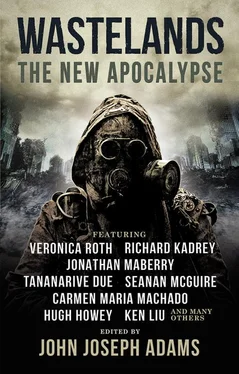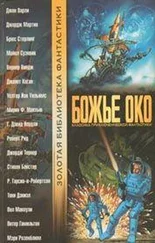“And dying,” he said.
“The whole world is dying. Seems like the perfect time for higher powers to reawake. You’re a singer. I’m a drummer. Kristi is a dancer… until her hands work again. We’re going to respect the vision that danced across our wall tonight. What’s the worst that could happen?”
“Nothing,” he said.
“ Nothing would be the very worst,” Kristi agreed.
“Right. Nothing. Moraine, I’m scared of nothing right now.”
He bit his lip, contemplative. “All right. Let’s get started, Ladies. Kristi needs regalia. What was the vision dancer wearing?”
“A dress?” Kristi said. “And a shawl? It’s hard to tell. The whole thing was a shadow.”
“A shadow…”
They needed black fabric. Lots of it.
The first flier the Apparently Siblings pinned to the community message board was short and informative:
BLACK FABRIC NEEDED
FOR A DANCE CEREMONY!
Hόόyíí! Please consider donating used clothes, thread, buttons, etc. A collection box is outside our door (Barrack 19, Room 3). FYI: you won’t need mourning suits once we destroy the virus with sick (but not actually sick) rhythm and motion. :D Cheers! Tulli+Moraine+Kristi of Apparently Siblings fame
The flier only attracted one donation, a pair of black wool socks. Somebody also offered to DJ their “plague prom.” Undeterred, they tried again:
BLACK FABRIC NEEDED
Hόόyíí! We are Apache/Navajo. Ceremonial dances have social and religious power in our communities. For example, we dance to honor veterans, win cakes, and appeal to grand forces. It’s a fact! Please help us perform a dance for community wellness. Leave used black clothing outside Barrack 19, Room 3. Thank you, bless you, and thank you again! Tulli+Moraine+Kristi
In came donations of lace-trimmed dresses, conservative blouses, and skirts: outfits made from silk, cotton, polyester, and rayon blends that were dyed every conceivable shade of black.
First, Tulli and Moraine crafted the dress with cotton and synthetic scraps, stitching a patchwork skin over Kristi’s body, its voluminous skirt trimmed by lace and tulle from mourning veils.
Next, they made her ankle-high moccasins by taping faux leather from a wannabe motorcycle jacket around her flip-flops. “I know we’re amateurs, but I’d look better wearing garbage bags on my feet,” Kristi said.
“They have charm,” Moraine promised.
“What will we do about the shawl?” she asked. “The ghost was definitely wearing one.”
“Voilà!” Tulli draped the black Pendleton blanket around Kristi’s shoulders. “All it needs is fringe. I’ll start shredding socks.”
As the pièce de résistance, Tulli fashioned three hair clips from the tail feathers. She thanked the turkey vultures; from rachis to barbed vane, their gifts held the plague eater’s blessing. Plus, those vultures had kicked her off the fence straddling belief and denial. Cathartes species didn’t live in the Mojave Desert; Tulli absolutely knew their territory because she Googled “where do turkey vultures live” after Kristi noticed one outside the White Train. Indeed, those birds were scientific proof of the supernatural; they had to be sent by powers greater than nature: spirits, ghosts, gods. All of the above?
“Are you ready?” she asked, pinning the blue-black feather to Kristi and the brown-black feather to Moraine.
“Shouldn’t we practice?” he asked. “I’ve only heard this song in my head. What if I can’t hit the high notes?”
“No time. The virus ruins lives every hour. Plus, Kristi’s boots are falling apart, and we won’t find another free motorcycle jacket. Do you want to scrap your leather pants, Buddy? It’s now or never.”
As the Apparently Siblings marched outside, turkey vulture groupies landed on the barrack rooftops. Neighbors peered out windows and gathered in dirt streets to marvel at the birds. Some people leaned against canes or shivered atop wheelchairs, their faces tilted skyward. “They think we’re carrion!” a man said, laughing at his own gallows joke. Nobody else would.
“Follow us!” Moraine shouted. “To the memorial courtyard!”
The vultures—two, three, four dozen—swooped from their perches and hopped-waddled-hobbled after the Apparently Siblings, their wings spread for balance. Draped from head to toe in black, Kristi led the procession, supported by her two friends. With the setting sun at their backs, their shadows stretched ahead of them and parted the light that fell against the glittering white stones in the circular courtyard. A pillar—white marble, nine feet high—jutted from the belly of the courtyard. Its bronze plaque read: IN MEMORIAM. Already, several names had been etched into the base of the pillar, but there remained room for thousands on its blank faces: one canvas that Tulli hoped would remain empty. She crouched against the eastward-facing side and beheld the night encroaching.
“What’s with the birds? Everybody go inside! Back to your rooms, please!”
Was that security speaking? A doctor or administrator? Though the voice was magnified by a bullhorn, Tulli could not see its source beyond the wall of spectators and turkey vultures that surrounded her.
“On my count,” she said, drumstick raised. “Káye, dáki, táłi!”
“What?” Moraine asked.
“Sorry. That was Lipan. Um, what’s the Diné word for three?”
“Just use English,” he said.
“Three, two, one!”
Moraine sang in clear, deep vocables; it had been ages since Tulli heard his voice without a hint of guttural death growl. Stunned, she nearly missed her entrance. The first beat on her toy drum cracked like a whip.
Rap!
Even with a bullhorn, the security-doctor-administrator could not overwhelm Moraine.
Rap, RAP, rap!
Tulli’s drum spoke of healing and hunger.
Rap!
Kristi spread her arms and began to spin as she orbited around the memorial pillar, clockwise. By the second loop, she staggered more than she spun; every successive loop was smaller, closer to the pillar, as if it drew her in. On the fifth, she fell and crawled.
“Almost done!” Tulli shouted.
RAP!
The ground crumbled, and darkness enveloped their world, a darkness so absolute, even phosphenes vanished. As if drawn together by organic magnetism, Tulli, Moraine, and Kristi found each other and linked arms as they fell. “Are we dead?” Moraine hollered.
“I feel great,” said Kristi, “so probably.”
“Do you see that?” Tulli asked. “Below us!”
Two arms lit by their own radiance—glowstick-bright bones illuminating muscle, veins, and flesh with cool red light—sprouted from the abyss; their skin was rough with pox scars, their nails curled like talons. The Apparently Siblings landed on one pillowy, massive palm.
“Children,” a hoarse, tooth-rattling voice said, “I enjoyed the performance.” It came from everywhere, as if the void spoke.
“Thank you!” Tulli rolled into a sitting position; she’d landed gracelessly. They all had. “Are you its composer? Are you the one who gave us visions?”
“I am.”
“It’s an honor. May I ask, um…”
“Why?” Kristi interrupted. “There are lots of decent people on Earth, so why choose us instead?”
“Because,” the void said, “I am your biggest fan. Apparently Siblings, when you scream in dim places, I listen, and I relish what I hear.”
So they did serenade the right person. Tulli knew it would happen eventually, though she’d expected a human talent scout. “Will… you help?” she asked. “Help make us and everybody else healthy again?”
Читать дальше


![Nick Cracknell - The Quiet Apocalypse [= Island Zero]](/books/28041/nick-cracknell-the-quiet-apocalypse-island-zero-thumb.webp)









